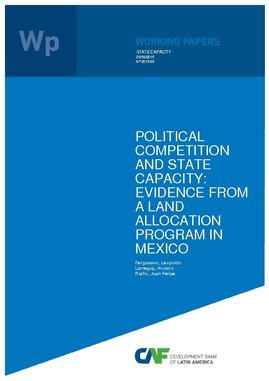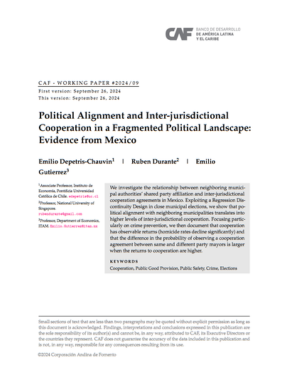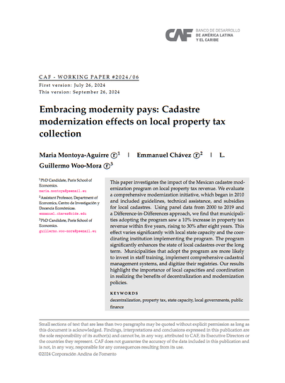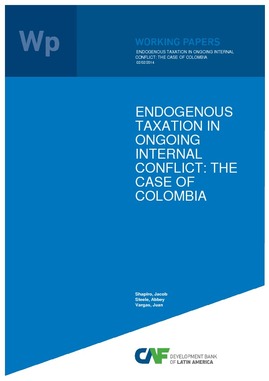Mostrar el registro sencillo del ítem
Political constraints and state capacity: Evidence from a land allocation program in Mexico
| dc.contributor.author | Fergusson, Leopoldo | |
| dc.contributor.author | Larreguy, Horacio | |
| dc.contributor.author | Riaño, Juan Felipe | |
| dc.coverage.spatial | México | en_US |
| dc.date.accessioned | 2015-07-28T14:26:22Z | |
| dc.date.available | 2015-07-28T14:26:22Z | |
| dc.date.issued | 2015-07-20 | |
| dc.identifier.citation | Fergusson, L., Larreguy, H., & Riaño, J. F. (2015, July 20). Political constraints and state capacity: Evidence from a land allocation program in Mexico. CAF. Retrieved from https://scioteca.caf.com/handle/123456789/764 | en_GB |
| dc.identifier.uri | https://scioteca.caf.com/handle/123456789/764 | |
| dc.description.tableofcontents | In this paper we contribute to the understanding of the politics of state building. We emphasize that incumbent clientelistic parties might have incentives to sustain state fragility when politically challenged. We develop a theoretical model of the politics of state strengthening, and test its implications exploiting a unique policy program from Mexico. Incumbent clientelistic parties have a comparative advantage in clientelism as opposed to in public good provision. Investments in state capacity –conceived as a reduction of the cost of providing public goods– consequently undermine their comparative advantage. Therefore, when politically challenged by opponents, clientelistic incumbents may oppose to invest in state capacity. To test this hypothesis, we exploit a unique land allocation program in Mexico. When granting land to communities, the government decided whether to locate them close or far from municipality heads, thus affecting its future ability to provide public goods. Our empirical design uses the distance of the newly allocated land from municipality heads as a measure of local state capacity choice, and exploits a national shock that threatened the Institutional Revolutionary Party (PRI)’s hegemony in the early 1960s but had different intensity across the various Mexican municipalities. Our difference-in-differences estimates corroborate that the PRI allocated land farther away from municipality heads in places where it expected more political contestation. | en_US |
| dc.language.iso | en_US | en_US |
| dc.publisher | CAF | en_US |
| dc.rights | CC-BY-NC | es_ES |
| dc.rights.uri | http://creativecommons.org/licenses/by-nc/4.0/ | es_ES |
| dc.subject | Investigación socioeconómica | en_US |
| dc.subject | Políticas públicas | en_US |
| dc.subject | Recursos naturales | en_US |
| dc.subject | Sector público | en_US |
| dc.subject | Servicios públicos | en_US |
| dc.subject | Vivienda | en_US |
| dc.title | Political constraints and state capacity: Evidence from a land allocation program in Mexico | en_US |
| dc.type | workingPaper | en_US |
Ficheros en el ítem
Este ítem aparece en la(s) siguiente(s) colección(ones)
-
6.1 Documentos de trabajo en investigación socioeconómica
En esta colección se encuentran los documentos de trabajo sobre temas económicos y sociales prioritarios para la región.






